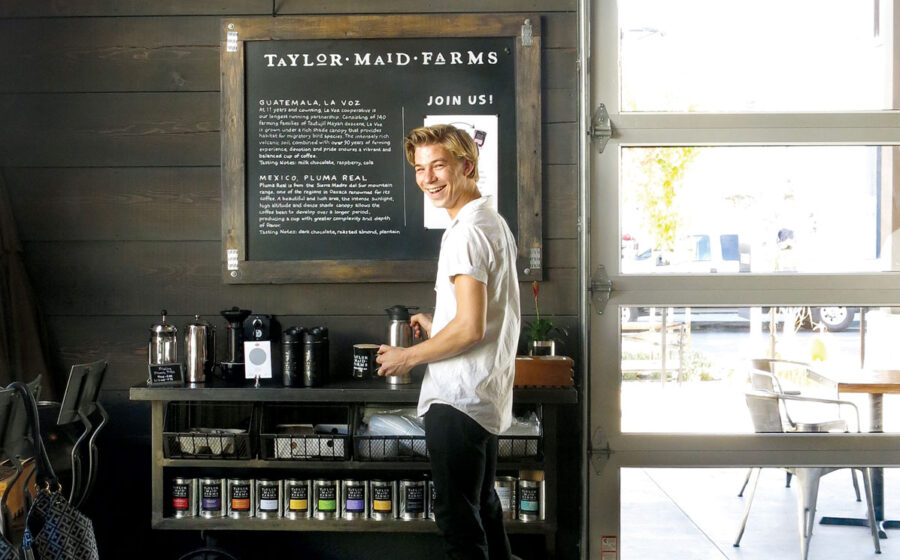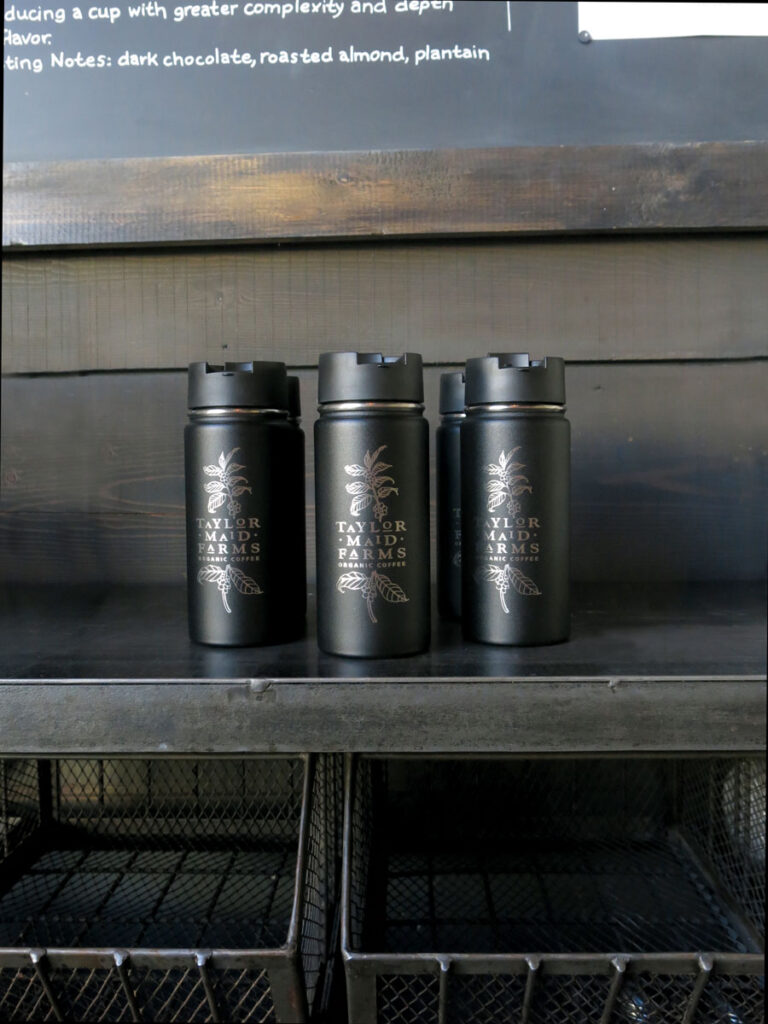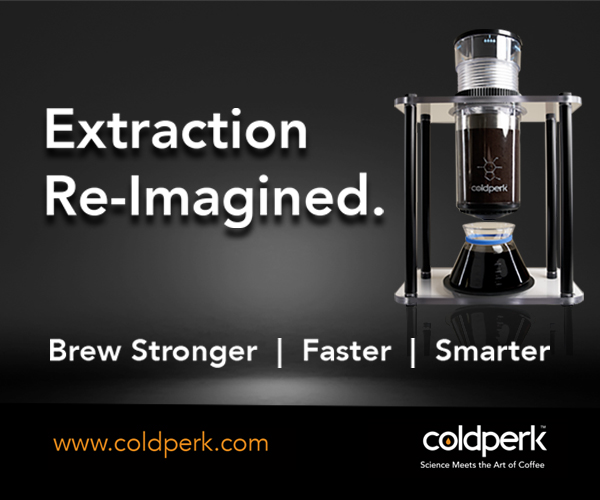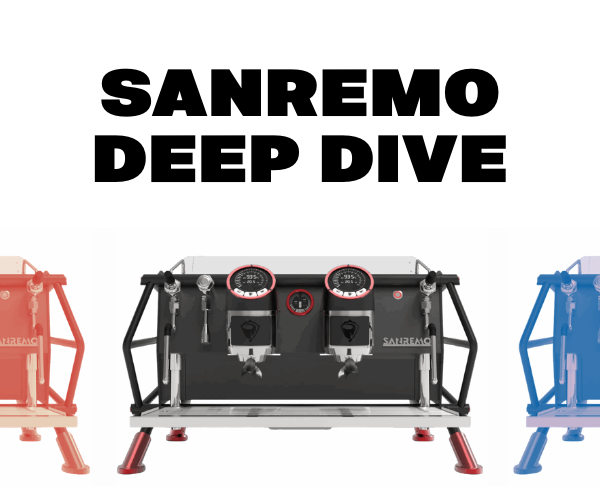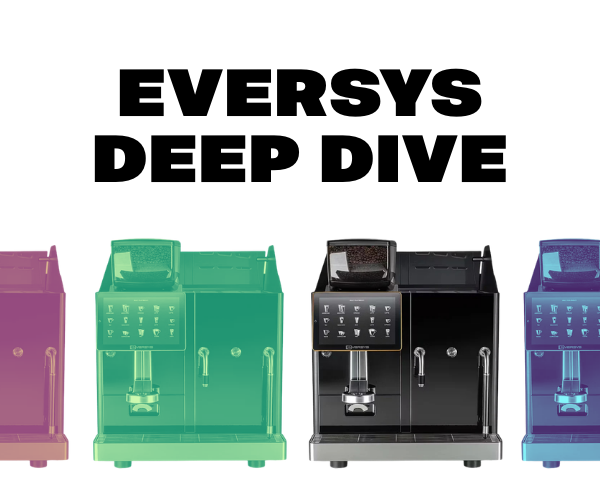[A] visit to Taylor Maid Farms’ café and roastery in Sebastopol, California, is not unlike a trip to many third-wave shops.
Repurposed wood makes up stairs, counters, and shelves lined with Japanese brewing wares, filters, and bags of fresh roasted beans. A friendly staff is happy to talk about roasts and extraction, with a small table off to the side equipped with single-group espresso machine and V60s for demonstrations, when talking doesn’t cut it. There’s education in the air (mingled with the region’s farm-to-foodie charm), but Taylor Maid’s baristas are intent on imparting more than just their knowledge of brewing and beans. They’re also really stoked on cups.
Reusability is integral to Taylor Maid’s business model. The company breathes its sustainability ethos into everything it does. Reducing waste is a big part of that. So not only does the roastery boast repurposed redwood, it also employs compostable and recyclable packaging and an energy-efficient roaster, and runs a coffee can refill program (going strong for fifteen years). And, Taylor Maid sells branded, reusable cups.
With new companies like KeepCup and Joco promoting reusability with barista-friendly sizes and design and websites thick with scary statistics about paper waste, more consumers are getting amped about having their own reusable vessel, and it’s hard to find an argument against it. It makes sense for cafés, which save money on disposable products and lower their carbon footprints by encouraging customers to bring their own cup; it assuages our eco-guilt as consumers; and it’s also another way for specialty drinkers to geek out, because coffee gear, including branded drinkware, is that fun mix of useful and cool.
At Taylor Maid, a company with green ethics at its forefront, a sustainability council with members from different sides of the business sits down to discuss these things. The last two years Taylor Maid has brought awareness to reusability by rolling out new, branded drinkware on Earth Day. In 2014, the café and roastery was stocked with branded KeepCups. In 2015, those were replaced with stainless steel, eighteen-ounce Hydro Flasks with an etched arabica design. Both Taylor Maid locations (Sebastopol and San Rafael) also sell a classic, ceramic Taylor Maid mug.
There are a number of ways to incentivize customers to bring in their own mugs. A simple way is to offer a discount when they do. Some retailers knock off a dime (Starbucks). Taylor Maid takes off twenty-five cents. When a customer purchases the Hydro Flask, Taylor Maid also offers a free fill with their nitrogenated cold-brew, which anytime they bring the vessel back, they get fifty cents off of.
“It’s cool to see other companies doing the same thing,” says Sheena Urie, Taylor Maid’s head of coffee bar operations, about the increased prevalence of personal mugs in the café. “We strongly believe that the best reusable cup is just the one that you use.”
Cafés hoping to up their sustainability game can go branded or not, but branded cups make their way into other shops, and other regions, spreading the name of the company far and wide. There is also an extra pull to buy a logo mug, since it isn’t something that can be ordered on Amazon or found just anywhere; it becomes a little piece of the customer’s visit to a coffee destination.
Taylor Maid also keeps its reusable cups on the demo table, where baristas periodically brew pour-overs and the like for curious customers. The shelves stay stocked, but the cafés order fairly small quantities, which keeps demand up and merchandise rotating. And Taylor Maid uses social media to market its cups. More organic promotion happens when Taylor Maid baristas and their Instagram accounts head to other roasteries, as baristas are known to do.
“We’ve done barista crawls and a lot of us come back with branded reusable cups from the places we’ve been,” says Urie. “It’s kind of like this inside thing where, ‘Oh, you should see my collection of reusable cups.’”
Those uber-friendly coffee community vibes work for everyone, when the reward is less waste, a higher markup on drinks, and a growing community of specialty coffee drinkers.
“It’s not like, ‘Oh, an Acre [Coffee] cup came in today, what the heck,’” says Urie. “It’s like, ‘Oh, that’s awesome! That’s a cool cup!’”

